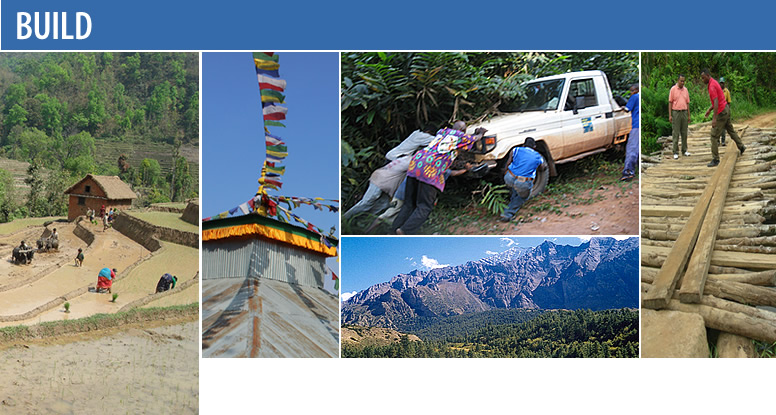Biodiversity Understanding in Infrastructure and Landscape Development (BUILD)

USAID’s support to the Conservation Strategy Fund (CSF) through the Biodiversity Understanding in Infrastructure and Landscape Development (BUILD) program (2011-2015) aimed to improve policy, regulatory and planning approaches to avoid or reduce negative impacts of infrastructure development on biodiversity. CSF applied economic tools for conservation results and created lasting human capacity for infrastructure analysis with the goal of improving selection, design and mitigation of key projects in focus regions including Africa’s Albertine Rift, South America’s Andes-Amazon, and Asia’s Himalayas. The program strengthened the capacity of governments, citizens, and the private sector to work together to balance expanding infrastructure with conservation.
BUILD Final Report
The overall goal of BUILD was to support the development of ecologically sound, economically efficient and socially equitable infrastructure policies and investment decisions. Recognizing the economic, institutional, cultural and legal barriers to the adoption of biodiversity-friendly infrastructure policies, BUILD focused on leverage points with the potential to bring about systemic change.
For more information on BUILD, download the BUILD Fact Sheet or explore CSF's project page.
BUILD Project Resources

Ecological Compensation to Address Environmental Externalities: Lessons from South American Case Studies
Large development projects commonly cause damage to ecosystems, even after measures have been taken to avoid and reduce impacts on site.

Guidelines for Conducting Economic Analysis of Environmental Impacts in Uganda
The Government of Uganda with support from the Conservation Strategy Fund (CSF) through the National Environment Management Authority (NEMA) has developed these guidelines for economic analysis of environmental impacts as a step forward in the process of environmental impact assessments within the country.

Análisis económico de la carretera Pucallpa - Cruzeiro do Sul: CSF Documento en Discusion - Numero 3 Junio 2012
El planteamiento y formulación de un proyecto de interconexión vial entre la ciudad de Pucallpa, capital del departamento de Ucayali, con el Brasil data de hace más de cuarenta años.

Costs and Benefits of the Inambari River Hydroelectric Project
Tapping hydropower in the Andean slopes is a key feature in Brazil’s electricity strategy.

Infrastructure and Conservation: The Case of a Pucallpa-Cruzeiro Do Sul Transport Link
The project for a Pucallpa-Cruzeiro do Sul highway interconnection would represent the last section of what is known as the Central Interoceanic Highway (IOC), one of the primary roads in the package known as the Initiative for the Integration of the Regional Infrastructure of South America (IIRSA).

USAID Biodiversity Understanding in Infrastructure and Landscape Development (BUILD) Fact Sheet
USAID’s support to the Conservation Strategy Fund (CSF) through the BUILD program aims to improve policy, regulatory, and planning approaches to avoid or reduce negative impacts of infrastructure development on biodiversity.

Pave the Impenetrable? An Economic Analysis of Potential Ikumba - Ruhija Road Alternatives in and Around Uganda’s Bwindi Impenetrable National Park: CSF Technical Series No. 35 | April 2015
In July 2012, the Ugandan government’s Uganda National Road Authority (UNRA) advertised the opportunity to design and construct 1,900 km of strategic roads in the country.

Análisis Económico y Socioambiental de los Proyectos de Interconexión Pucallpa-Cruzeiro do Sul
Las grandes obras de infraestructura, como los proyectos de interconexión terrestre, juegan un rol estratégico para el desarrollo de las naciones.

Costos y Beneficios del Proyecto Hidroeléctrico del Río Inambari
El Acuerdo Energético firmado por los gobiernos de Perú y Brasil en junio de 2010, pero aún no aprobado por los respectivos congresos nacionales, prevé que compañías brasileñas construyan, en ríos de la Amazonía peruana, centrales hidroeléctricas para exportar energía al Brasil.

El Filtro de Carreteras: Un Análisis Estratégico de Proyectos Viales en la Amazonía
El Filtro de Carreteras es una herramienta de análisis desarrollada por Conservación Estratégica para apoyar la conservación y el desarrollo sostenible.

Impactos Econômicos da Construção da Hidrelétrica de São Luiz do Tapajós ao Provimento de Serviços Ecossistêmicos Para a População Local e Regional
Caso a AHE São Luiz do Tapajós seja construída, muitos serviços ecossistêmicos serão impactados, influenciando o bem estar de centenas de pessoas que deles dependem.

Right Priorities for Africa’s Power Sector: An Evaluation of Dams Under the Programme of Infrastructure Development for Africa (PIDA)
Under the auspices of the African Union, in 2012 African heads of state adopted and endorsed the Programme for Infrastructure Development in Africa (PIDA) as the blueprint for the continent’s infrastructure development agenda.

Guía Nacional de Valoración Económica del Patrimonio Natural
Conservar y proteger los recursos naturales involucra aplicar distintos mecanismos, entre ellos, perspectivas avanzadas que motiven el uso ambiental sostenible de nuestros ecosistemas.

Letter: A Global Strategy for Road Building
The number and extent of roads will expand dramatically this century1.

Estimating Environmental & Biodiversity Costs of Oil Pipeline Development in Murchison Falls National Park, Uganda: CSF Discussion Paper - Number 10 December 2015
Commercially viable quantities of oil and gas resources have been discovered in the Albertine Rift region of Uganda.

A Cost Effectiveness Approach to Routing of Linear Infrastructure in Environmentally Sensitive Areas: A Case of a Crude Oil Pipeline In the Albertine Rift in Uganda: CSF Discussion Paper - Number 7 February 2015
The government of Uganda has plans to construct a pipeline to deliver crude oil from its central processing facilities in Buliisa District, to a refinery to be located in Kabale parish in Hoima District.

Moving towards Greener Infrastructure: Innovative Legal Solutions to Common Challenges: CSF Discussion Paper - Number 6 April 2014
This report seeks to identify opportunities for the application of effective and innovative legal tools designed to reconcile infrastructure, conservation, and gender concerns.

Financial Mechanisms for Environmental Compliance in Infrastructure Projects: CSF Discussion Paper - Number 5: June 2013
Energy and transportation infrastructure are building blocks of development.

Pave the Impenetrable? An Economic Analysis of Potential Ikumba - Ruhija Road Alternatives in and Around Uganda’s Bwindi Impenetrable National Park
In July 2012, the Uganda National Road Authority (UNRA) advertised a request for expressions of interest to design and construct 1,900 kilometres (km) of strategic roads in the country.

Moving Towards Greener Infrastructure: Innovative Legal Solutions to Common Challenges
For most countries, developing transport and power-generation infrastructure is vital to progress.





